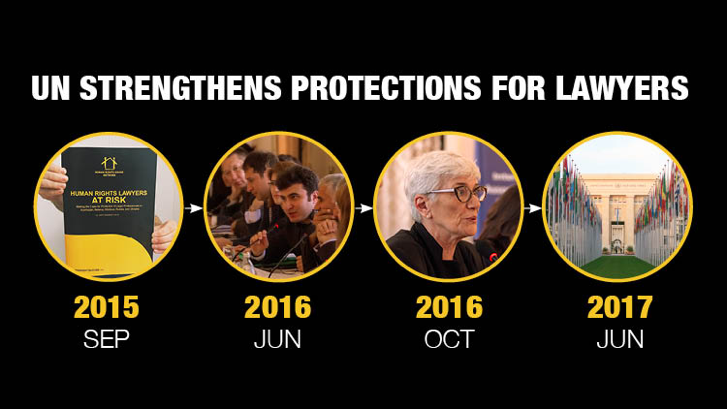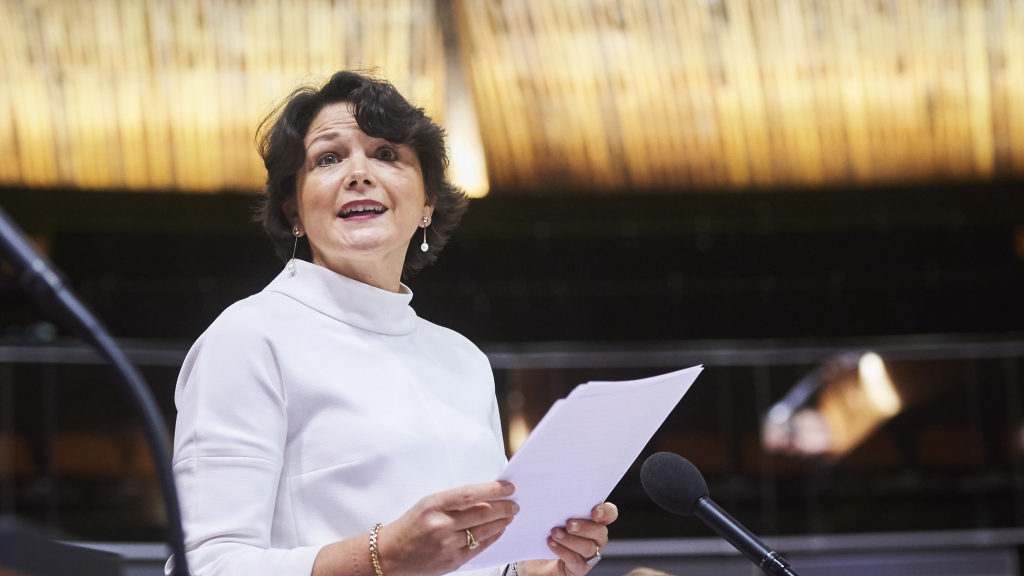These attacks are even increasing in some States, where they have become “widespread and systematic and are apparently the result of deliberate policy,” states the Parliamentary Assembly of the Council of Europe (PACE) in its January 2018 recommendation.
Pressure has intensified on lawyers working on human rights or representing individuals who claim that their rights have been violated. This is documented in the report Human Rights Lawyers at Risk – prepared by alumni of the Human Rights Houses’ ILIA programme and by HRHF – which has formed the basis of HRHF’s advocacy on protecting lawyers and the independence of the legal profession.
The trend observed in Eastern Europe is particularly worrying. In a number of countries, it is no longer efficient or safe for lawyers to work on human rights as authorities violate many of the key guarantees and protections for their work. This includes the authorities breaching the principle of confidentiality between lawyer and client, and impeding the rights of clients to protection. A lack of implementation has also diminished trust in human rights instruments and the international courts.
More than this, lawyers working on human rights face retaliation in the form of harassment, threats, and intimidation. These violations threaten the well-being of societies and the functioning of States under the rule of law.
PACE adopted the recommendation on 24 January – the Day of the Endangered Lawyer. It called on the Committee of Ministers – where all CoE member states’ foreign ministers are represented – to draft a convention on the profession of the lawyer. This could be the first step in a process at the European level to strengthen guarantees for lawyers and create an enforcing instrument to hold States accountable for abuses. The Committee of Ministers is set to respond in the coming months.
Is the recommendation strong enough?
On the basis of the recommendation, a future convention would most probably not include all categories of lawyers, applying only to members of national bar associations. This is a matter of concern as it potentially leaves out some of the lawyers who are most at risk, especially considering serious questions over the independence of bar associations in some countries.
Going beyond the threats to lawyers and their work already mentioned, authorities have in some cases retaliated against human rights lawyers by disbarring them from their professional organisation or by launching criminal charges against them.
The cases of lawyers Alaif Hasanov in Azerbaijan and Veaceslav Turcan in Moldova are clear examples of this abusive practice. Hasanov was disbarred in connection with his work defending political prisoners, while Turcan has faced criminal charges in relation to his activities as a lawyer.
If a future convention maintains a strong distinction between lawyer members of national bar associations and those who are not, authoritarian governments would have further reasons to increase pressure on lawyers and keep them outside the Bar.
For a European convention to truly address threats to lawyers, its guarantees and immunities must extend to all human rights lawyers, including those that are not members of bar associations. The protections enshrined in national and international law must also be implemented and respected.
In the process of preparing a reply to the Assembly’s recommendation, it is important that the Committee of Ministers widely consults with civil society and lawyers, especially in countries where they are more at risk. The issue of disbarment of lawyers needs to be appropriately addressed in order not to further penalise lawyers who are already confronted with inappropriate interferences by their governments.
Adoption and background to the PACE recommendation
To address the worsening environment in which lawyers operate and to strengthen their guarantees, PACE prepared and adopted a report under the title “The case for drafting a European convention on the profession of lawyer.” The rapporteur – Sabien Lahaye-Battheu (ALDE, Belgium) – explored the situation of lawyers in different Council of Europe member states and underlined the importance of lawyers’ work to ensure the respect for human rights and the rule of law. The report raises some national situations of particular concern within the Council of Europe region, such as the cases of Azerbaijan, Russia and Turkey.
The Assembly adopted the January recommendation based on the report, with 33 votes in favour and 4 against. The Assembly recalled standards set out by the Committee of Ministers in its recommendation of 2000 and called for these to be translated “into a binding instrument in the form of a convention.”
The Assembly also promoted the idea of establishing an early-warning mechanism to respond to immediate threats faced by lawyers, and in particular “threats to their safety and independence and to their ability to perform their professional duties effectively.” MPs suggested taking the existing platform on the protection of journalists as a model that would potentially work also for lawyers.
During the preparation of the report, the rapporteur consulted with a number of experts, including prominent Azerbaijani human rights lawyer Khalid Baghirov, the director of the Lawyers’ Committee for Human Rights (Yucom) Milan Antonijevic and HRHF’s Head of Advocacy Florian Irminger. The issues they raised included the need for a definition of lawyers that is not strict but includes all kinds of lawyers, the importance to address reprisals against lawyers cooperating with the Council of Europe, and the reluctance by lawyers to join bar associations when these clearly lack independence from the authorities.
Rapporteur Sabien Lahaye-Battheu (Belgium, ALDE), presents her report: The Case for Drafting a European Convention on the Profession of Lawyer.Thanks to the Parliamentary Assembly of the Council of Europe for the recording. Watch the full debate (starts at 3 hours 37 minutes).
During her address prior to the adoption of the recommendation, rapporteur Sabien Lahaye-Battheu said: “If lawyers cannot exercise their professional activities independently and free from pressure from authorities or anyone else, the judicial protection of human rights and the proper functioning of the judiciary in general are placed in jeopardy. There is therefore a very real threat to the rule of law.”
The rapporteur also referred to her exchanges with alumni of the ILIA programme and with HRHF and the Council of Bars and Law Societies of Europe (CCBE). These highlighted worrying aspects related to the lack of independence of bar associations in some Eastern European countries and the need to consider this in the preparation of the convention.
German MP Frank Schwabe (Socialist group) underlined: “Human rights are under pressure. We all know that human rights defenders and lawyers are under special pressure.”
International standards on the independence of lawyers
The PACE recommendation comes months after the adoption of an important UN resolution on the independence of lawyers, by the Human Rights Council (HRC) in June 2017.
This incorporates robust language against reprisals and on strengthening the implementation of guarantees and immunities.
The resolution came almost two years after the launch of the Human Rights Lawyers at Risk report in September 2015. During this time, HRHF continued to promote the recommendations of the report and advocate for stronger protection for lawyers.

In June 2016, HRHF and Human Rights House Belgrade hosted and organised consultations with the UN special rapporteur on judges and lawyers, Mónica Pinto, to enable HRHF and partners to provide recommendations to her mandate ahead of her upcoming report to the UN. More than 50 lawyers, legal professionals, and human rights defenders from Europe, Caucasus, Central Asia, and the Balkans gathered in Belgrade, many coming from Human Rights Houses’ ILIA programme or working with partners such as the International Bar Association’s Human Rights Institute (IBAHRI) and the Council of Europe.
The special rapporteur’s report was presented to the UN General Assembly in October 2016. It advocated protections for lawyers and gave clear recommendations.
In the report, the special rapporteur highlights that “state authorities too often use their control over the licensing of lawyers to prevent certain persons from entering the legal profession, or to exclude lawyers they deem to be problematic.”
She also states that “these lawyers are often those who take human rights cases or other sensitive cases such as police abuse, corruption, or terrorism-related cases.”
The report outlines strong guarantees and immunities for lawyers working on human rights and gives clear recommendations on to implement them. Upon its publication, HRHF called on states and bar associations to implement these recommendations, and for the international community to ensure that they do so.
Documents:
-
- Report: Human Rights Lawyers at RiskThe report Human Rights Lawyers at Risk: Making the Case for Protection of Legal Professionals in Azerbaijan, Belarus, Moldova, Russia, and Ukraine was launched in Warsaw 23 September 2015.
- (Russian) Report: Human Rights Lawyers at RiskIn Russian, the report Human Rights Lawyers at Risk: Making the Case for Protection of Legal Professionals in Azerbaijan, Belarus, Moldova, Russia, and Ukraine. This was launched in Warsaw on 23 September 2015
More on protections for lawyers
Threatened lawyers: the end of the rule of law in Europe?
The Council of Bars and Law Societies of Europe (CCBE) held a side event on 24 January, right before the PACE debate on the matter. The event brought together lawyers from European countries and was a forum in which lawyers identified deficits and problems with respect to the independence of lawyers and professional guarantees.
The vice president of CCBE Maria Slazak highlighted the dangerous situation in some Eastern European countries where national Bars do not function as professional bodies for safeguarding lawyers’ professional guarantees.
International Law in Advocacy
“International Law in Advocacy” is a Human Rights Houses programme to improve the professional knowledge and skills of lawyers from the Eastern Europe and South Caucuses region in the field of human rights, and to strengthen civil society in participating countries.
The curriculum has been successfully certified by experts of the European Humanities University (EHU) and has been awarded academic credits in compliance with the European Credit Transfer and Accumulation System (ECTS). Courses focus on using the knowledge gained by students in advocacy work and in implementation in their home country. The program also fosters an active, international network of alumni lawyers. The ILIA program is sponsored by the Norwegian Ministry of Foreign Affairs.





